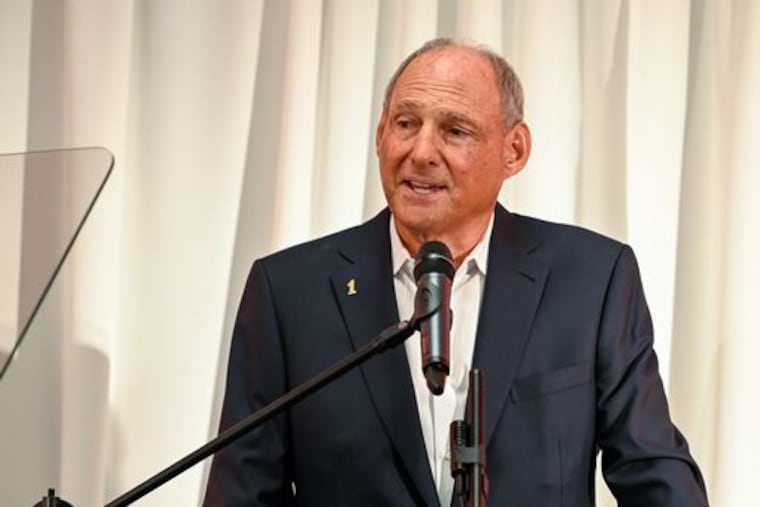At Firstrust Bank, founded and still owned by the Green family, a new name will take over as CEO
"It does help that we have one shareholder: I’m demanding, but patient," says owner and outgoing chief executive Richard Green.

For 88 years, patriarchs of the Green family owned and ran what’s now called Firstrust Bank — founder Samuel, son Daniel, grandson Richard.
But as of Jan. 1, Richard J. Green is stepping down as Firstrust’s chief executive. For the first time a non-Green is taking the top job: the bank’s current second-ranking officer, Timothy J. Abell.
The Conshohocken-based lender has $5 billion in loans and other assets, and nearly 500 staff between headquarters and its 19 branches: five in Philadelphia, 14 in the suburbs, plus outposts in Allentown, Cherry Hill, and Towson, Md. It has half as many branches as similarly sized rivals — which has become an advantage at a time when U.S. banks are closing their 72,000 remaining offices at the rate of 1,000 a year, as customers bank by phone and online.
» READ MORE: From 2015: At 93, Dad steps aside to give his son the top job
Firstrust is also one of the last of the former herd of banks based in the region, and which competed to finance small employers, family businesses, and family loans. And the bank the Greens founded is the largest of a very few area banks that are still family-owned.
Most local banks have sold out to larger lenders as technology made it easier to shop for loan and deposit rates and investments from afar, squeezing sales and profits. But federal deposit records show Firstrust is more profitable, on a crude return-on-assets basis, than remaining local rivals WSFS, Univest, or Republic.
Green, who is a part owner of the Philadelphia Eagles, in addition to owning Firstrust, will stay on as executive chairman, looking over Abell’s shoulder, calling on familiar clients. And he’s not ruling out that a younger Green (he has three children, none at Firstrust) could someday take over.
Green and Abell spoke to The Inquirer about the transition and the state of their business. Answers have been edited for clarity and brevity.
Why leave now?
GREEN: I’m a man of a certain age — I’m 70. I’ve been doing this for 45 years, that I’ve been paid. As a kid I tagged along, unpaid, with my father [who lived to age 98] and grandfather [to 89]. I’m in good shape, and the bank’s in good shape. I want to pay attention to the Green Family Foundation. And, by now, Tim and I have been working together for 18 years. It feels like the right time.
You’d have more cash for the foundation if you sold the bank.
GREEN: I’m not saying it’s impossible, but it’s not in my head right now to go public or sell. We can do more of what we’re doing, with Tim.
How do you stay in business, with so many people banking online and by smartphone, and big national competitors?
GREEN: This bank has never been too heavy on bricks and mortar. [It has about half as many branches as Univest or Republic, whose loans and deposit totals are similar to Firstrust’s.] In our lifetimes there will still be a place for a branch.
There are a lot of family businesses in our area. I know a lot of the people you see in The Inquirer who own very large businesses — the Yohs [Day & Zimmerman], the Woods [Wawa]; Harold Scattergood [Boenning & Scattergood] was my neighbor. They all know us, and they know we’re a family business, too.
Are you still big enough to compete, with all the tech and security costs?
GREEN: Technology is actually a great leveler between large and small banks. We’re spending a lot of money on our digital transformation. And we will spend more; that’s where banking is headed.
We are large enough to make those expenditures when we are thoughtful. Some things we have to customize, but a lot we can take right off the shelf, from the same vendors much larger banks also select.
So size isn’t necessarily determinative. It does help that we have one shareholder: I’m demanding, but patient. It enables us to focus on longtime value creation, not growth for growth’s sake. We are not successful today because of what we did last week but because we made decisions months and years ahead.
Firstrust owns other companies, including Hatch Bank, regulated by California as an “industrial loan company,” with less regulation. What does it do?
GREEN: It’s kind of a laboratory, like Betsy Cohen’s [Delaware-based)] Bancorp Bank, to find what services we can do for the new financial technology [fintech] lenders. And we have Apex Commercial Capital, which does equipment leasing and real estate finance, services that not everyone offers. And Firstrust Financial Resources, that’s wealth management. And we’re the official bank of the Philadelphia Eagles.
Tim Abell, early in your career you worked for Continental, Prime, and other Philly-focused small-business banks, now gone. What’s different here?
ABELL: There’s a lot of advantages to being privately owned. We do operate under that long-term vision. We don’t have to worry as much about quarterly earnings reports. So, as other community banks have sold, it’s made more opportunity for us — their customers come to us. I want to accelerate that.
Our story resonates — we are a family business; we like financing other family businesses. Five billion dollars is big enough to fund a lot of [client] transactions, but small enough to keep our relationships. We have plenty of room to grow in Philadelphia.